Ranking Little Women: Book vs. Movie ('94) vs. Movie ('19)
In which Greta Gerwig's greatness is thoroughly explored
My first experience with the March sisters was the 2019 Greta Gerwig version. I had never read Louisa May Alcott’s novel, nor had I seen the 1994 adaptation.
I decided to read the book for the first time, watch 1994, and then rewatch 2019 so I could compare.
I won’t keep you in suspense: Greta Gerwig’s adaptation is the best version of this story, even though the book is excellent. And I am sorry to report that the 1994 version is not a good adaptation or film.
Let’s talk about it.
Little Women (1994)
If this version is near and dear to you because you saw it as a little woman or man, then I apologize, but this adaptation missed the mark on too many levels.
There are some good things about it. The cast, generally speaking, is stellar. We have Winona Ryder as Jo, Susan Surandon as Marmee, Kirsten Dunst as Young Amy, Claire Danes as Beth, and even Christian Bale as Laurie. They are all excellent performers, and many of them are wrong for the roles they play.
They do capture some key moments from the book, the chemistry between the sisters themselves is very enjoyable, so I can understand that maybe this was good for its time, but alas, there are unforgivable sins.
Jo and Laurie
Winona Ryder and Christian Bale are both wrong in their respective roles.
Ryder’s Jo, especially, does not capture the spirit of the character. They chose to deemphasize her “tomboyish” looks and behavior, as well as her creative pursuits, while emphasizing the romantic connection between her and Laurie in the early parts of the story. This leads to the Laurie proposal falling completely flat, because it doesn’t make sense in the context of the story they’ve told so far. This is an important scene in the book, so they include it, but based on how the two actors interacted up to this point, Jo turning Laurie down doesn’t feel natural or credible. Up until this moment, nothing in how their relationship is depicted, or in how Jo carries herself, would suggest that this rejection is in character.
I also really disliked Bale’s choices for this moment. Laurie comes across bitter and cruel when rejected, which did not feel congruent with my experience of him in the book.
But the sins against both of these characters do not end there.
Amy and Laurie
They make the very strange choice of casting two different Amy’s in this version, which means when we first see Laurie and Amy interact, he’s still Christian Bale, and Amy is a CHILD. This creates such a weird dynamic when we’re eventually supposed to buy these two as a couple, especially when Bale starts referencing interactions that he had with Baby Amy in order to seduce slightly-less-baby-Amy.
This relationship, and especially this sequence in France, is core to the story. Laurie is heartbroken after being rejected by Jo, and he and Amy begin to set apart their friendship when she calls him out for his behavior and attitude. She really puts him in his place and he takes it to heart. This leads to Laurie changing his ways, and allows them to build a real romantic relationship. It takes time, and it comes from friendship first.
The movie botches this whole storyline.
Laurie hits on Amy after immediately seeing her, and in this initial proposal Laurie’s manner is despicable (his whole “I should be a part of the March family” suggesting that he doesn’t even really want Amy in that moment is so gross). She gives him a very mild dismissal, and then the next time they see each other they are in love, and none of it works.
Jo and Professor Bhaer
Speaking of awful age gaps and romances that don’t work. This might be the most egregious of them all. I don’t have anything against Gabriel Byrne, but the man was 43(!) while Ryder was just 22 at the time of filming. I can only assume that Gen-Z hasn’t cancelled this film because they haven’t seen it.
Nothing is less believable than Jo turning down Laurie, saying that she doesn’t think she will ever get married, and then two minutes later being in love with a man almost twice her age, who I would assume was close to death based on Civil War era life expectancy.
Okay, I just looked it up and it’s 68, but still.
And this is how they end Jo’s story! With Professor “likes them” Bhaer-ly Legal making a weird proposal, and Jo saying she doesn’t really care about her writing that much, she wants to open a school or whatever.
Thanks, I hate it.
Little Women (Book)
I loved the book. It’s delightful. Although I am sad to report that some of the nonsense from the 1994 version does come from the book. The Bhaer romance and the end of Jo’s story is pulled straight from the book. Bhaer is older, but I don’t remember if they specify his exact age. While I greatly enjoyed the novel, on the whole, I had a few minor squabbles with it as well.
I thought it was too long. There were entire scenes and sometimes chapters that just felt like fluff. Although this is a double edged sword. Some of these sections felt a little long to me, but the sheer amount of time we spend with the March family is part of what allowed me to connect with them. Those small details, and little moments bring it to life, and while not everything felt significant (to me), maybe that lends to the feeling of authenticity, like you’re actually getting to see the lives of these real people unfold, where some mundanity can’t be avoided. And who is to say that the overall feeling I had of richness didn’t also come from some of the sections that I felt like were “too long”?
Something else I did not enjoy was the strong preachy tone, and undercurrent of pilgrim-y Christianity. Some of that was just a little too on the nose for my liking, and in my opinion some of it has not aged well (the entire section where Marmee tells Meg that it’s her fault her husband is going to hang out with another woman every night comes to mind).
One manifestation of this that I cannot forgive is Bhaer criticizing Jo’s stories as immoral filth, and for her reaction to essentially be, “Oh no, he’s right, it IS filth, and I must do better and be a good little woman, oh yes, I must!”
Not in those exact words, of course.
I was offended on Jo’s behalf. She should be allowed to write pulp fiction if she wants to, without all the guilt and sermonizing.
But I’ll reemphasize that the novel is incredible, and my experience with it was a pleasure.
However, Greta Gerwig takes this incredible story, and she adapts it in a way that improves upon it in almost every respect.
Little Women (2019)
Seriously, Gerwig is so good at this. Not only does she fix every problem with the 1994 version, but she also addresses virtually every gripe I had with the novel itself, elevating the whole. She’s also somehow more faithful to the source material than ‘94, while creatively carving her own path with the structure of the story and, maybe most importantly, the ending.
Let’s get into some of the specifics.
Structure
Immediately we notice a difference because Gerwig opens her version with Jo in New York, so we know this is the later timeline. While the book and the 1994 version are both very linear, Gerwig smartly recognizes the symmetry between the two time periods, and how going back and forth allows us to fully see these characters.
I address how this impacts Jo, Amy, and Laurie below, but probably my favorite example of this is for Beth. The unique structure allowed Gerwig to show us both of Beth’s illnesses back to back. There is a sequence where Jo wakes up and sees Beth is missing from the bed, she hurries down the stairs, and goes to the table in the kitchen. The blocking and shots for these scenes are similar. In both cases we are following Jo downstairs as she is trying to figure out what happened to Beth. In the earlier timeline we come downstairs to tears of joy, as Beth is sitting at the table with Marmee, seemingly feeling much better. In the later timeline we come downstairs to tears of pain and despair as Marmee is sitting at the table alone. These two scenes are a beautiful contrast with each other as we look at the coloring, the music, and even Jo’s manner. The way Gerwig tells the story allows us to see these two things back to back for great effect. It’s a powerful artistic choice that really works.
Casting
Not only is this an incredible cast across the board (talk about an embarrassment of riches when Laura Dern, Meryl Streep, and Bob Odenkirk are your supporting players), but Gerwig perfectly cast the core roles. The holy trinity of Jo (Saoirse Ronan), Amy (Florence Pugh!), and Laurie (Timothee Chalamet) could not be more perfect. We also have a perfect Beth in Eliza Scanlen, and Emma Watson is definitely in the movie.
I know I just wrote “perfect” a lot.
But back to the core three. Let’s break it down like we did for 1994.
Jo and Laurie
Ronan beautifully portrays Jo’s tomboyish nature and somehow communicates a deep platonic love for Chalamet, even as they spend all of their time together. Chalamet’s Laurie, on the other hand, is immediately infatuated with Ronan’s Jo, to the point when he finally says “I have loved you ever since I’ve known you” it rings true in the most devastating way possible.
This also illustrates Gerwig’s understanding of Jo as a character. She is committed to her writing. She has larger ambitions than what the world would seemingly allow her to have. Marriage was never her dream.
Amy and Laurie
Florence Pugh has redefined the character of Amy for a generation. This is not a shock, since she is one of the most exciting and gifted young actors working today. They made the sane choice of having Pugh play both versions of Amy, and she pulls off both ages convincingly, due in part to wardrobe and hair styling, but the rest is all ACTING!
Knowing that Amy and Laurie are going to end up together, Gerwig plants all the seeds early to make that not only credible, but also something we would want as an audience. I don’t think it’s an accident that Gerwig starts the story in the later timeline. This allows us to see Jo in her life in New York, focused first on her writing (of course), but also the first other character we see Jo with is Professor Bhaer. Likewise, the first time we see Amy she is already in Paris, and besides Aunt March, the first character we see her with is Laurie!
In this way Gerwig anchors these four characters together in our minds. From the start we see Amy and Laurie together. It feels like we are building to this moment in a meaningful way, rather than the focus from the start being Jo and Laurie and then needing to course correct in the 12th hour.
Gerwig and Pugh play up this connection in the younger sections as well. Notice the way Amy looks at Laurie when she first meets him, or the hilarious references to her feet (”I have lovely small feet, the best in the family” or “I’m making a mold for Laurie to remind him I have nice feet”).
All of this setup already puts us on a firm foundation for this relationship, but Gerwig completely fixes the Paris sequence as well. Amy and Laurie start off as friends, the easy association picking up from where they left off, as two people in an unfamiliar place cling to the familiar. We know that Amy has loved Laurie from the start, and so her criticism of him at this low point hits that much harder, and this is the role that Amy plays in the book as well. She does not pull her punches. This shakes him out of his grief and pity for just long enough to allow them to build a friendship that is purely their own, unconnected to Jo, or Amy’s other sisters. We also get the great line from Amy “I want to be great or nothing,” which I was pleased to see is directly from the novel as well.
When Laurie eventually goes out on a limb and tells Amy not to marry the other guy, the way Pugh plays it is brilliant, and makes this one of the most heartbreaking moments of the film (and remember we lose Beth, so that’s saying something). When she responds by telling him that she’s been second to Jo in everything her whole life, the pain is palpable, and then we get the finisher, “Not when I’ve spent my entire life loving you.”
My sense is that this film allowed a lot of people to truly see Amy for the first time, but it was interesting reading the book having seen this version first, because for me that version of Amy was in the book as well.
R.I.P. to Saoirse who can’t seem to bag Chalamet in any movie though (shout out to Lady Bird).
Theme
Another thing that I absolutely love about the 2019 version is the sharp thematic focus, and how each little woman’s story shows us a variation on that theme.
This story is about what roles women are given and how the existing economic power structures play into what opportunities are afforded or denied. Each sister, but specifically Jo, Amy, and Meg show us a different side of this issue. It’s about money, and as we hear repeatedly throughout the film, marriage is an economic proposition.
Meg marries the poor tutor for love, to both Aunt March and Jo’s dismay. Aunt March is pushing for Meg to understand the realities of their situation, and to marry someone that will allow her to provide for the rest of the family. Marrying for love is a luxury that the March sisters cannot afford. Jo approaches Meg from the other extreme, you should be on the stage, you should be an actress, and is gently rebuffed with the “just because my dreams are different than yours doesn’t mean they are unimportant.” And yet, while she loves her husband and their life, she still feels pressure to purchase the pretty silks that she cannot afford. There is no escaping the economic reality of this world.
Jo seeks to reject the current power structures and “make her own way in the world.” She is also rebuffed by Aunt March (”no one makes their own way, not really, least of all a woman, you’ll need to marry well”) but the lesson doesn’t stick. Jo wants to be a writer, and so she writes and she sells stories, and she does her best to make her way in the world on her own. This means rejecting Laurie and eventually rejecting Professor Bhaer.
Amy’s story gives us yet another perspective. Aunt March rightly deduces that Amy sees the situation with a clarity that perhaps escaped Meg and Jo. This is the main reason why Aunt March takes Amy to Paris in this version, instead of Jo (the reasoning in the book is slightly different). Amy demonstrates that she has learned the lesson in one of the best scenes of the film.
Amy: “I’ve always known I would marry rich, why should I be ashamed of that?”
Laurie: “There’s nothing to be ashamed of, as long as you love him.”
Amy: “Well, I believe we have some power over who we love, it isn’t something that just happens to a person.”
Laurie: “I think the poet’s might disagree.”
Amy: “Well, I’m not a poet, I’m just a woman. And as a woman there’s no way for me to make my own money. Not enough to earn a living or to support my family. And if I had my own money, which I don’t, that money would belong to my husband the moment we got married. And if we had children they would be his, not mine. They would be his property, so don’t sit there and tell me that marriage isn’t an economic proposition because it is. It may not be for you, but it most certainly is for me.”
There’s a sense that even Amy was trying to push back against her “fate” by trying to become a great and famous painter, and there is real pain when she seems to accept that her painting, however good it may be, does not rise to the level of genius which would be needed to escape the existing economic power structures for a woman. This scene also gives us the brilliant back and forth about women and the “club of genius.”
This is one example of why I believe the 2019 version improves upon even the book. Gerwig brings the prescient themes of the novel to the forefront in a way that Alcott couldn’t in her time.
And this brings us back to Jo. Gerwig gives us so much nuance in Jo’s emotional journey as she navigates all of these issues. This is another of the greatest scenes of the film, and worth rewatching.
“Women, they have minds, and they have souls, as well as just hearts. And they’ve got ambition, and they’ve got talent, as well as just beauty. I’m so sick of people saying that love is just all a woman is fit for. I’m so sick of it. But I am so lonely.”
Interesting fact: that dialogue is not from the book, Little Women, but is actually from a later novel by Louisa May Alcott called Rose in Bloom.
Jo knows that she would not be true to her authentic self if she just married for either love or money, and yet she is still lonely. As a woman, she wants to be seen as more than an “ornament of society” (as Amy puts it), and she is walking that path, but it is not without its own struggles and sacrifice. And that brings us to the ending.
Jo and Professor Bhaer
Gerwig fixes the criminal age gap between Jo and Bhaer, so we are off to a good start. As I mentioned above, Gerwig also pairs Jo with Bhaer early on, so we link these two in our minds. From the beginning it feels like we are actually building towards the ending, and spending enough time with these two characters together, that them ending up married could feel natural and actually satisfying.
Gerwig goes further by making Bhaer a little dream boat. This is probably best illustrated at the end when Bhaer is visiting the family and plays Beth’s piano. It is such a beautiful moment. He inquires about the piano, learns that it belonged to the now deceased Beth, and very tactfully offers condolences and tries to steer out of the conversation. When it is suggested that he should play, he is again mindful of the potential hurt, which shows that he is not trying to show off or aggrandize himself, but is genuinely conscientious of the feelings of the people around him. They talk him into playing and it feels like a healing moment, like for a second the huge gap left behind by Beth could maybe be filled just a tiny bit by another loving person added to the family.
Everyone loves Bhaer. It becomes clear that maybe even Jo loves Bhaer, but Gerwig makes the bold move that Alcott couldn’t during her time: she lets Jo stay single. In this way Gerwig stays truer to the nature of Jo than even Alcott is allowed to in the novel, and certainly more than the 1994 version.
Jo is allowed to be more than just her marriage prospects. She sells the novel that she wrote for Beth, and she does end up opening her school (like she does in the ‘94 version), but it’s clear that the reason she is doing it isn’t to submit to the current power structures of the world, but to push back against them. It is to be a school for both girls and boys, serving as perhaps just a small spark towards change.
Gerwig simultaneously changes key portions of the book while somehow staying truer to the heart of the characters and story than even Alcott’s original.
My feeling is that Alcott would have been happy with the changes. What do you think?





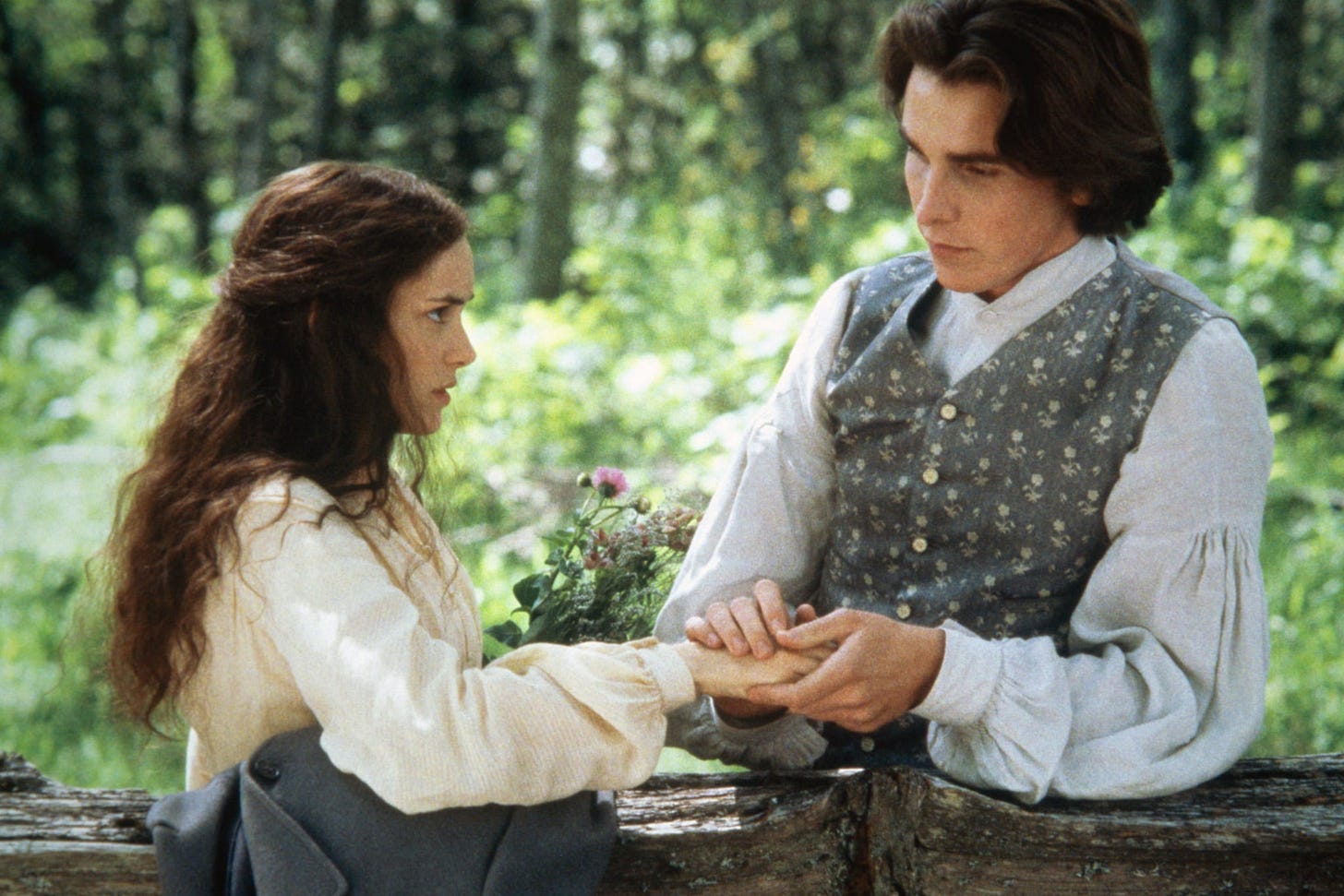
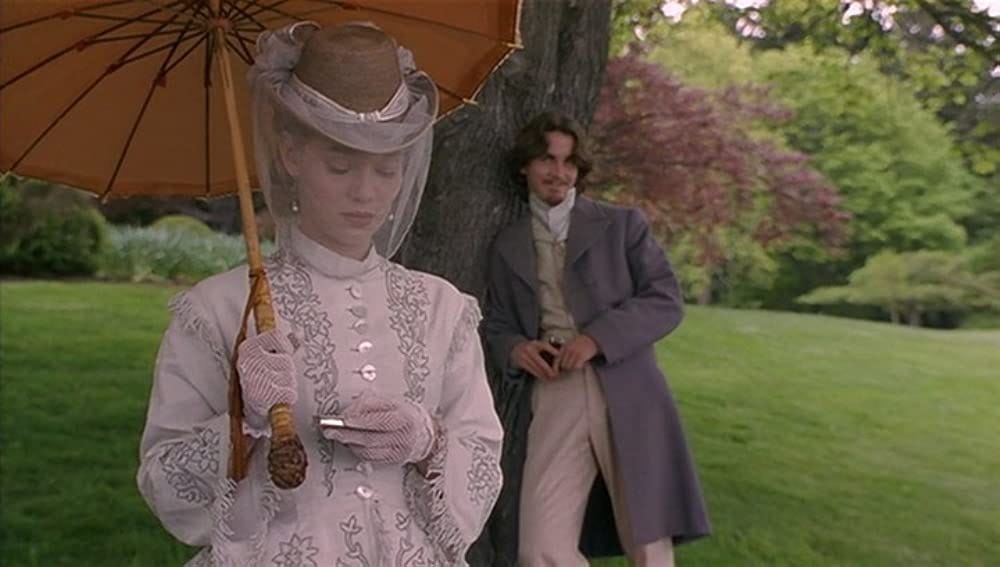
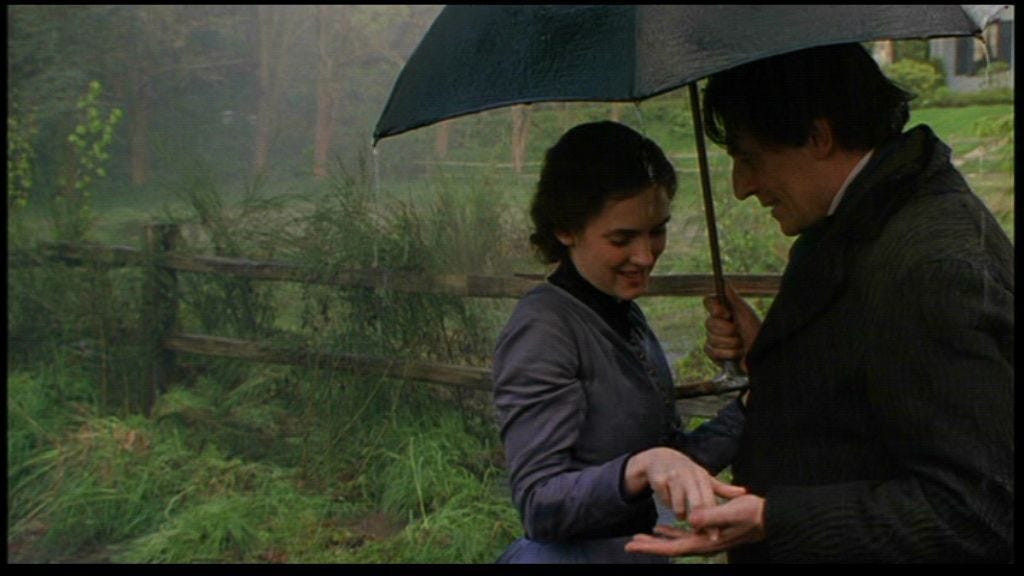
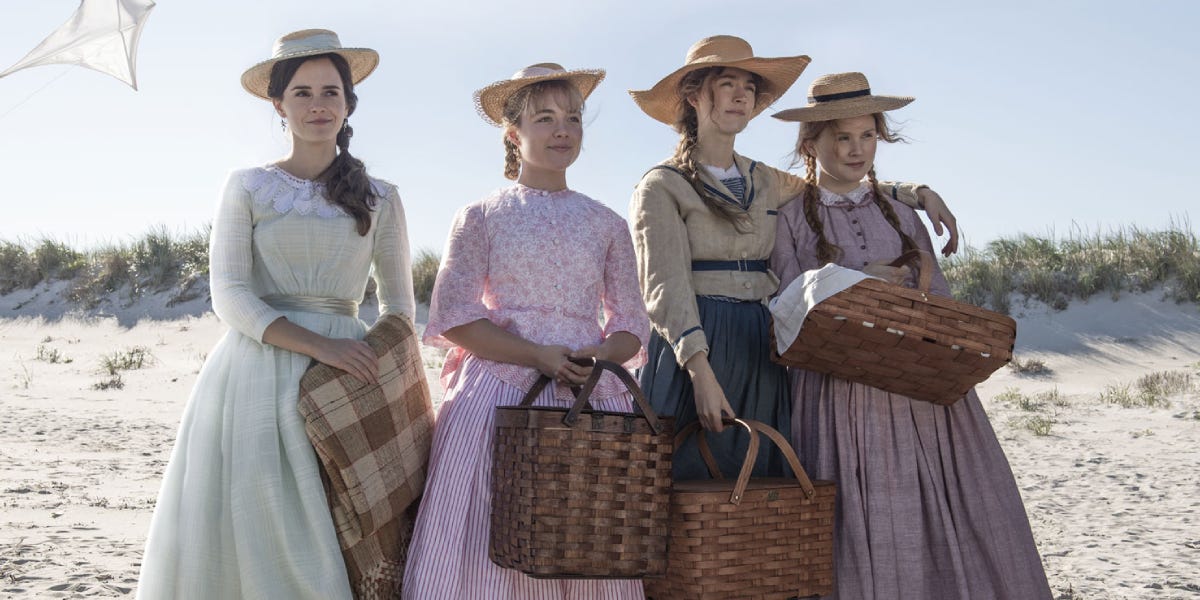
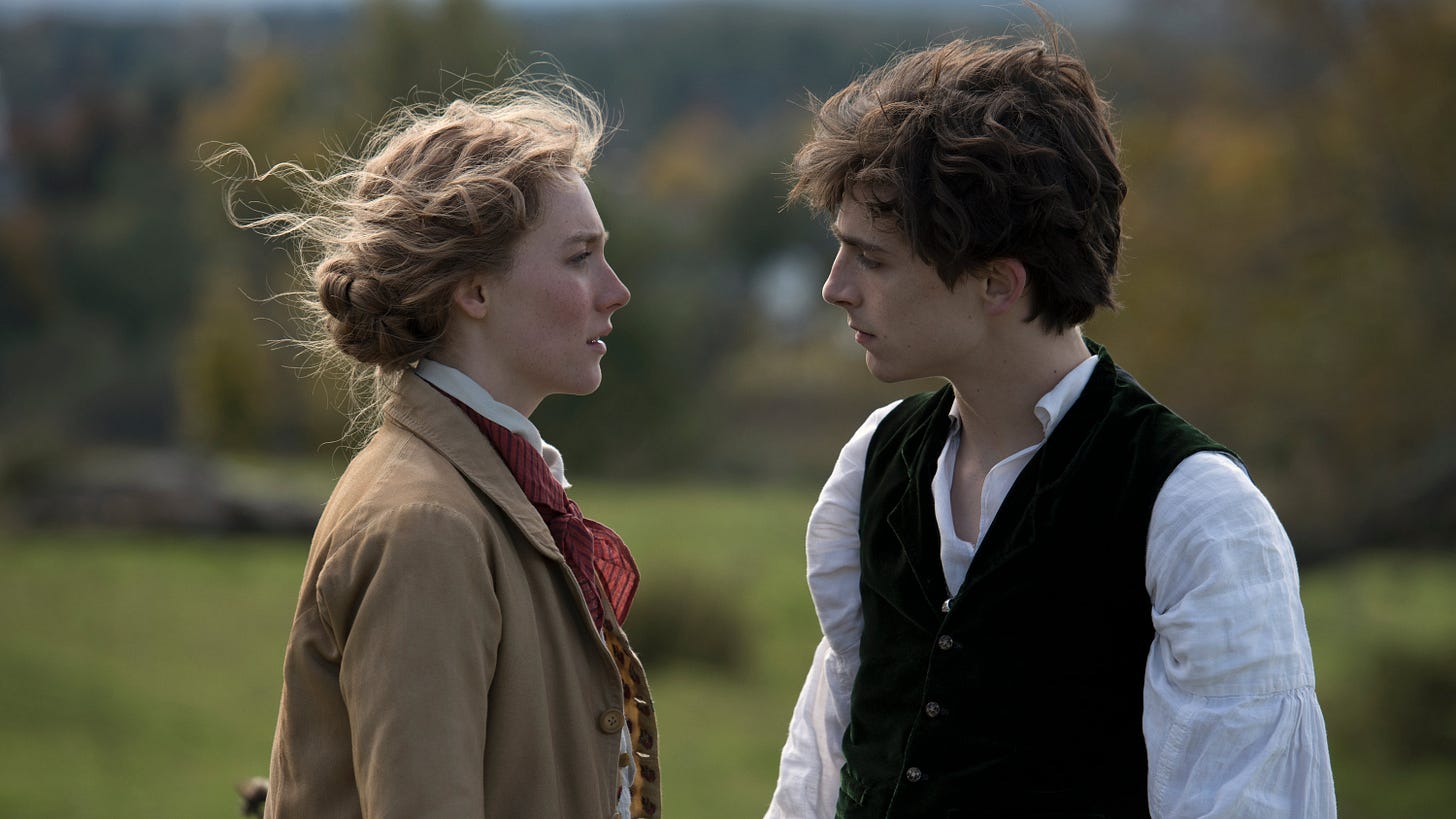
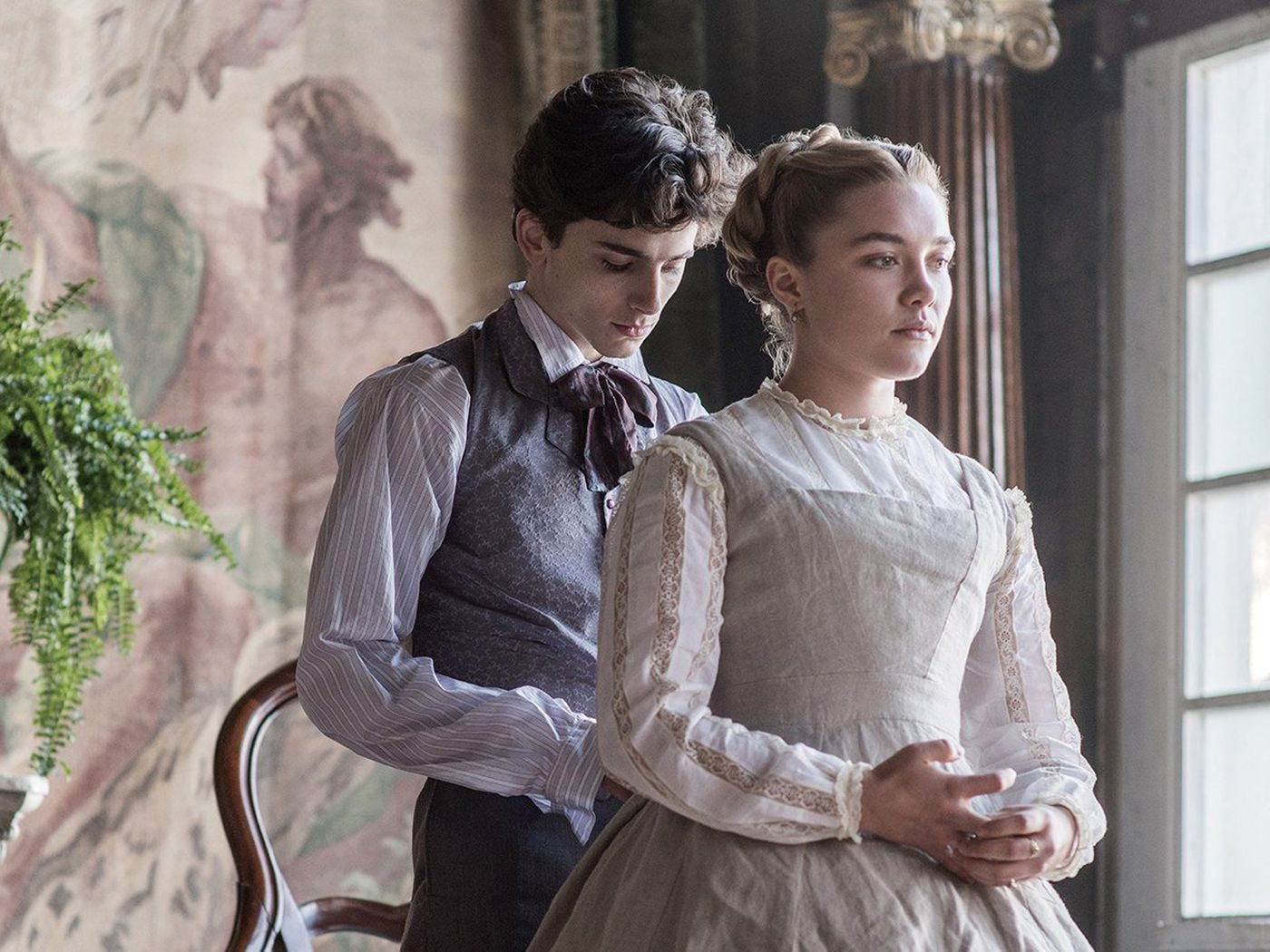
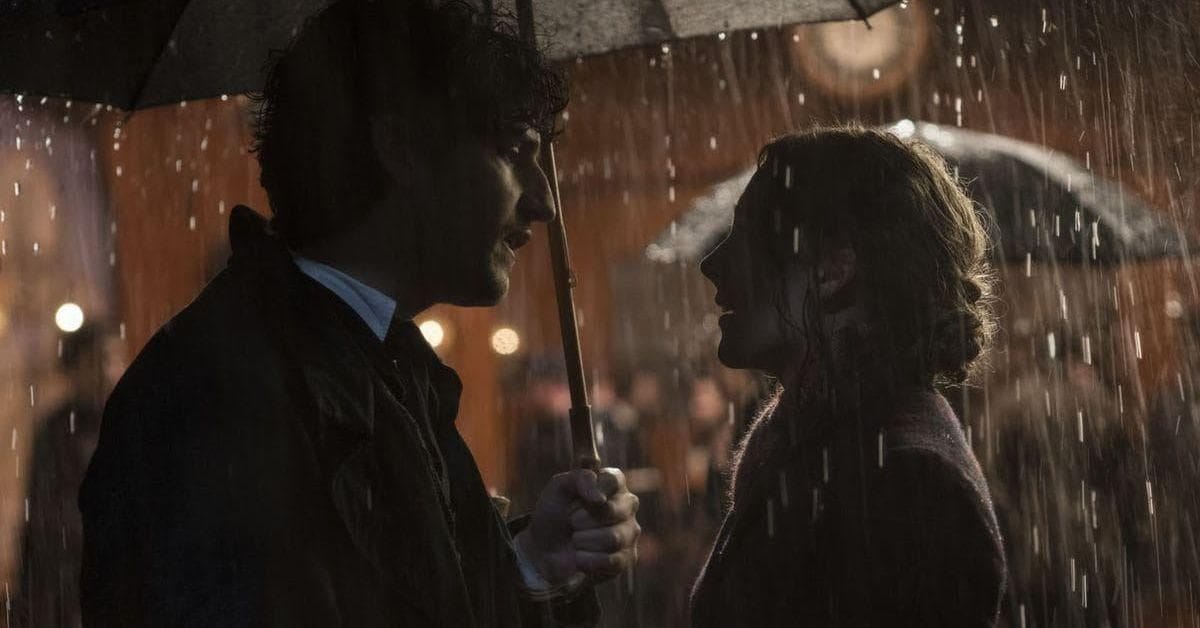
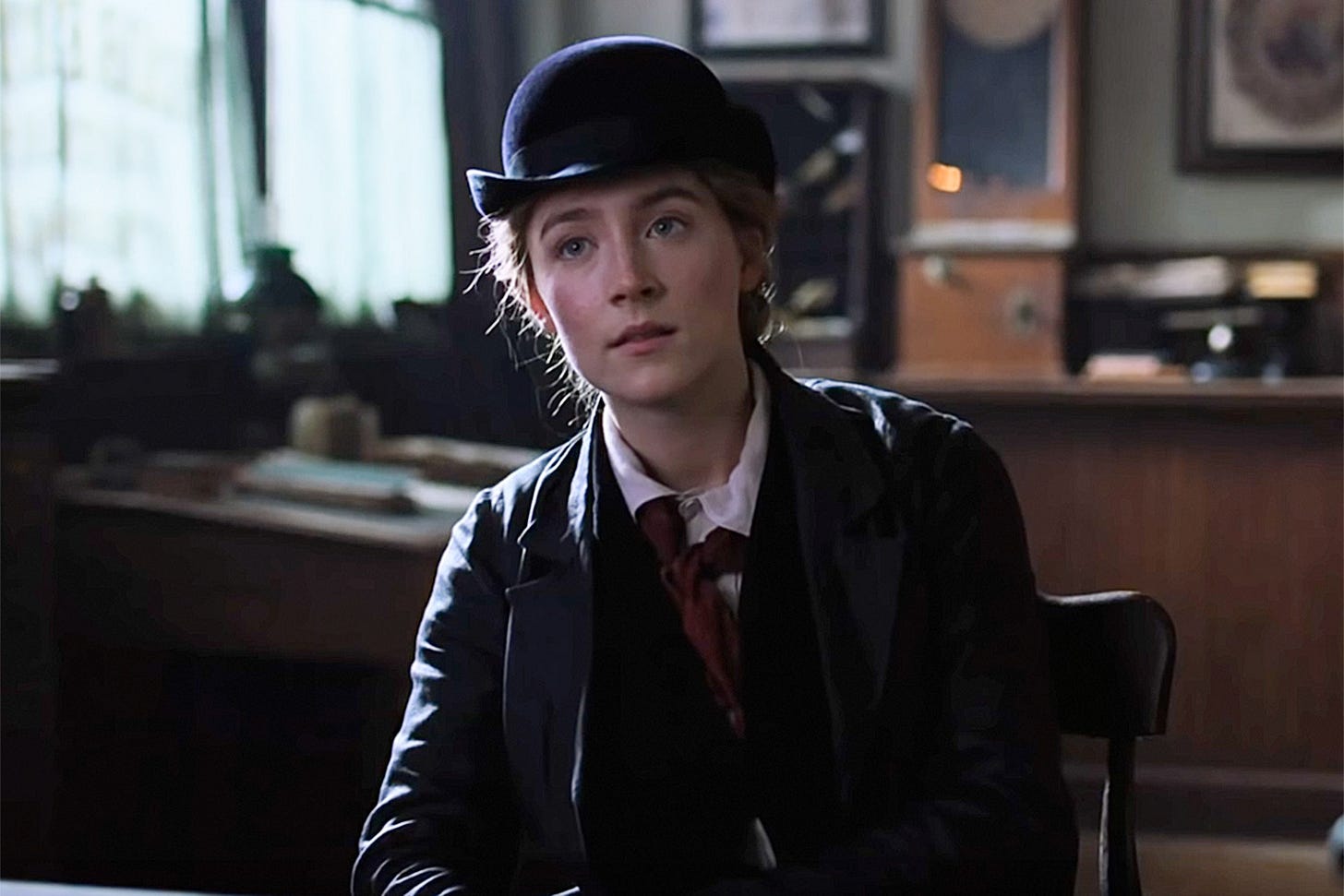
I love discussions like this! Glad to have found your Substack!
Michael, good piece, you’ve really hit on some of the issues with adapting novels for the screen. I think I used to have stronger opinions about that, but now I consider film so different from prose fiction that I’m willing to accept revisioning. Particularly when the movie rivals or even exceeds the original (example: The Sweet Hereafter with the young Sarah Polley).
Perhaps it’s useful to think of an adaptation as analogous to a translation of a work. For some reason, translations don’t last, every so many years someone does another translation and the old ones pretty much fall away. Yet not a word of the original has changed. Quite the paradox.
Some of it, I suppose, has to do with reader expectations and reader realities in the present age, but I guess our “understanding” of a work also changes. In other words, it’s impossible to do the same adaptation or translation because we’re no longer capable of reading the work that way.
Still, there’s a part of me that wonders if someone is going to do a revision, why not just go whole hog and do something stunningly original, the way West Side Story and Romeo + Juliet did for Shakespeare’s play?